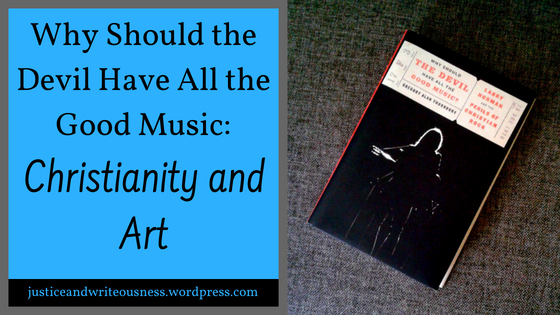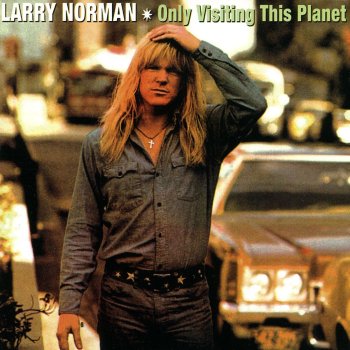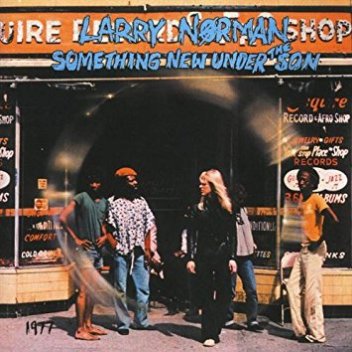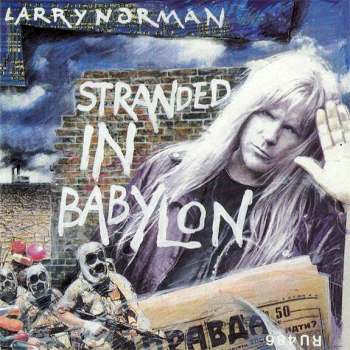
I’m guessing many of you, including my Christian followers, have never heard of Larry Norman. He was a Christian musician from the sixties and seventies, the father of Jesus rock, and an influence on both Christian and non-Christian musicians alike.
Throughout his career, Norman struggled with balancing evangelizing and creating true art. He felt like most of Christian music was propaganda, only enjoyable by Christians. Unsurprisingly, he had a rocky relationship with the Christian community- at times they called him a backslider or a Satan-worshiper, and viewed him as a wolf in sheep’s clothing, luring the Christian youth away from the Christ.
The biography Why Should the Devil Have All the Good Music?: Larry Norman and the Perils of Christian Rock by Gregory Alan Thornbury captures this struggle extremely well. I would go so far as to say that it’s a must-read for any Christian artist, whether a musician or a writer or any other kind.
Norman’s Career
 Larry Norman was divisive from the start. He was a rock’n’roll artist, and everyone knew that rock was the devil’s music. Even though he sang about Jesus, the Christian community didn’t believe he was legitimate (this inspired the song “Why Should the Devil Have All the Good Music?”).
Larry Norman was divisive from the start. He was a rock’n’roll artist, and everyone knew that rock was the devil’s music. Even though he sang about Jesus, the Christian community didn’t believe he was legitimate (this inspired the song “Why Should the Devil Have All the Good Music?”).
Even if they got past the genre Norman played, they were shocked at his lyrics. One song, “Be Careful What You Sign,” “begins with the protagonist murdering an innocent victim, and concludes with him committing suicide,” says Thornbury. Another song, “Nightmare #71,” is about how Hollywood controls everything. Many of his songs, like “The Great American Novel,” were political and accused the Church of being unconcerned about the world’s problems. This wasn’t as positive and uplifting as the Christian community would like.
Ironically, a senior music writer from Entertainment Weekly said, “[Norman] really could’ve been a star if he were singing about something other than Jesus.”
The Message of Christianity
Norman was caught between the Christian industry and the secular one. He faced the same questions that every Christian artist has to face. You want to spread the gospel message, right? But if you state it explicitly, who’s going to listen?
 As Norman pointed out, non-Christians don’t shop for Christian music. If your music explicitly calls people to Jesus, the only people who’ll listen will be those already in the Christian community. It’ll be preaching to the choir, literally. And if you’re trying to get a message across, is that art, or is it just propaganda?
As Norman pointed out, non-Christians don’t shop for Christian music. If your music explicitly calls people to Jesus, the only people who’ll listen will be those already in the Christian community. It’ll be preaching to the choir, literally. And if you’re trying to get a message across, is that art, or is it just propaganda?
But if you aren’t clear about your faith, will people hear it at all?
This all brings up another question: should we even be trying to reach a large audience? How much should we bury our message to appeal to more people? Although it may (or may not) seem like a straightforward answer at first, as you start working it becomes less clear, at least for me.
Christianity and Artistry
And just how important is artistry in all this? I wrote about what I think here. But then, Larry Norman tried to prioritize artistry and the Christian industry shunned him for it, embracing mass-produced fluff instead, because it’s ‘encouraging.’
 And can you try to get a message across and still have your work be art? Or does it become something else, like a sermon or propaganda?
And can you try to get a message across and still have your work be art? Or does it become something else, like a sermon or propaganda?
Most of the bloggers who I follow and who follow me have some sort of answer about how to sort through these issues, which is good. We’re thinking about our message and evaluating our place in bringing it to the world.
But in practice it’s often not as clear-cut as we’d like: is what you’re portraying real life that includes Jesus and the joys of Christianity, or is it veiled propaganda? Are you showing the world as it is and how some questions don’t have clear answers, or are you removing the truth from your work?
Larry Norman never struck a balance that pleased either the secular or the Christian world as a whole. His struggles are shown throughout his biography by Thornbury, which makes it an excellent read for any Christian artist. Even if you don’t know Norman’s music, there’s a lot to get out of his biography.
What do you think about the balance between evangelizing and actually reaching your audience?
Well said; it really does look as though there’s not much more that can be done as an artist with the message of Christianity, does it? renaissance took it to the pinnacle. Nowadays, there’s Akiane keeping the flame alive. The only way to use Christian themes to good effect nowadays is to pervert the original message, ref. “Piss Christ.”
There is, however, still some room left with regards to interpretations of the end of days, A painting of Jesus as anti-christ might turn a few heads: especially if Akiane did it!
LikeLike
I think there’s still room for the message of Christianity in art, though I agree it is more likely to turn heads when twisted in some way.
LikeLiked by 1 person
Great post! I think we all have our own stories and great songs are just powerful stories set to music. If it’s got Jesus, great, then it does. If it doesn’t, it doesn’t.
If a song has a title, it has a message and can be propaganda just by being well crafted because of the emotional connection/impact the song can have on the audience. Music is so powerful.
LikeLike
I like your take on how the emotional connection of a song makes it a message- music IS so powerful, and its influence shouldn’t be underestimated.
LikeLiked by 1 person
I think it’s vital that art with a Christian message shouldn’t be considered “only for the religious types.” There’s a whole culture around “preaching to the choir,” and I avoid most of what that industry produces. It’s too preachy, too sometimes downright offensive, too off-putting to non-believers, and honestly, it seems that a lot of the people who create it feel they are in fact superior to secular folks. And that just isn’t right on any level. I definitely prefer music/books/movies with an uplifting or encouraging message, regardless of if it’s spiritual or not, though it’s even better if the message comes from a spiritual place. (Chris Daughtry is an excellent example of this. Or Twenty One Pilots, though I don’t care for their style of music.)
LikeLike
Yes, I completely agree! Especially the superiority many stuff seems to have- it’s so frustrating, because that’s almost completely opposite to what it should be saying. I like Twenty One Pilots for that very reason- they have an uplifting, quietly spiritual message that doesn’t alienate nonbelievers.
LikeLiked by 2 people
I loved this post! Though I admit I’ve never heard of Larry Norman.
I’ve been thinking about this a lot recently because I just finished a draft of my novel that included strengthening the story’s theme, which got me thinking about theme and message and all that.
It’s sometimes confusing to hear so many conflicting opinions. Because my writing community is mostly Christian, I hear a lot about “giving glory to God through your writing”, but a some writers seem to think the only way to do that is by stating everything explicitly. There are even some pretty good arguments for it.
The clearest indicator for me is the fact I’ve read so many terrible Christian fiction (especially Christian fantasy) novels that I actually avoid the genre altogether unless I have a good reason to make an exception. Whereas I have read a lot of secular fiction that has inspired me, whether to see beauty in the world or to try to live as a better person.
So I write implicitly Christian fiction because of my experience, because my goal is to give anyone who wants it entertainment that is also inspiring rather than evangelism, but I still sometimes get confused by all the different arguments out there.
Maybe there isn’t one right answer for everyone? I don’t know. 🙂
LikeLiked by 2 people
Thank you for reading!
I guess I hadn’t thought about there being different answers for everyone. But that’s a good possibility. I DO think that some people are called or should consider explicitly writing for the christian community to challenge their faith and help them grow stronger in their faith, but definitely not everyone is called for that. And I know I avoid Christian fiction unless I have a good reason, like you do.
And yeah, that’s a great goal to entertain and inspire, regardless of beliefs, while still having an implicit Christian element, because that’s how you see life. That’s pretty much what I’m trying to do, but in practice I have a hard time striking a balance.
LikeLiked by 1 person
The answer for me has been to write what I want to read, and not worry about whether it’s religious enough or too religious — my undercurrent (messages about hope, responsibility, etc) is always strong, but I try not to be too preachy, because he’s right — if you are preaching, you’re preaching to the choir.
I think somewhere along the way, Christian art became confused with the idea that everything has to be propaganda — but true art ceases to be true art when it IS propaganda. I suspect God, being a Creator, is simply happy with us when we create something we are proud of. It doesn’t even have to be “religious” to contain His truths.
LikeLiked by 1 person
I agree- it’s frustrating seeing a lot of Christian ‘art’ because God IS a Creator, so I feel like we have a higher responsibility to create something good (to the best of our abilities). I still struggle with what that looks like on the page. But you are so right that it doesn’t need to be ‘religious’ to be true.
LikeLiked by 1 person
Some of the classics contain truth, depth, and beauty, but no explicit Christian messages apart from their themes. I’d rather read a good, deep book that makes me ponder something than a shallow, preachy book. The former will last. The latter will soon be forgotten.
LikeLiked by 1 person